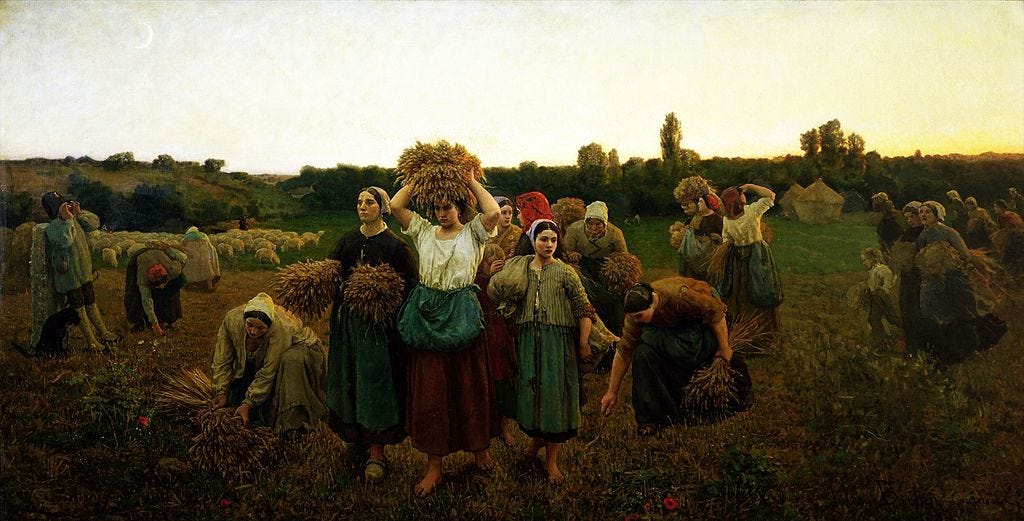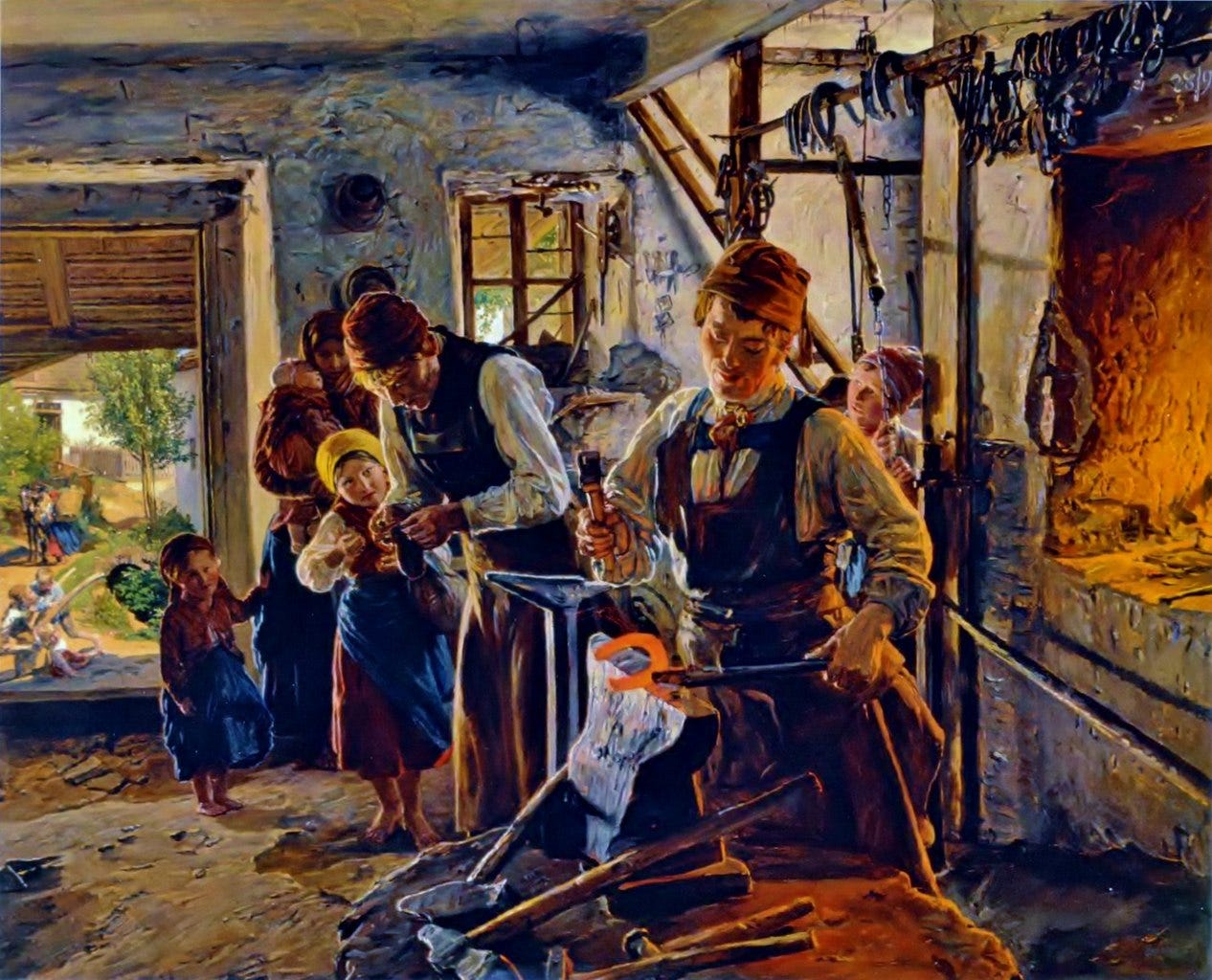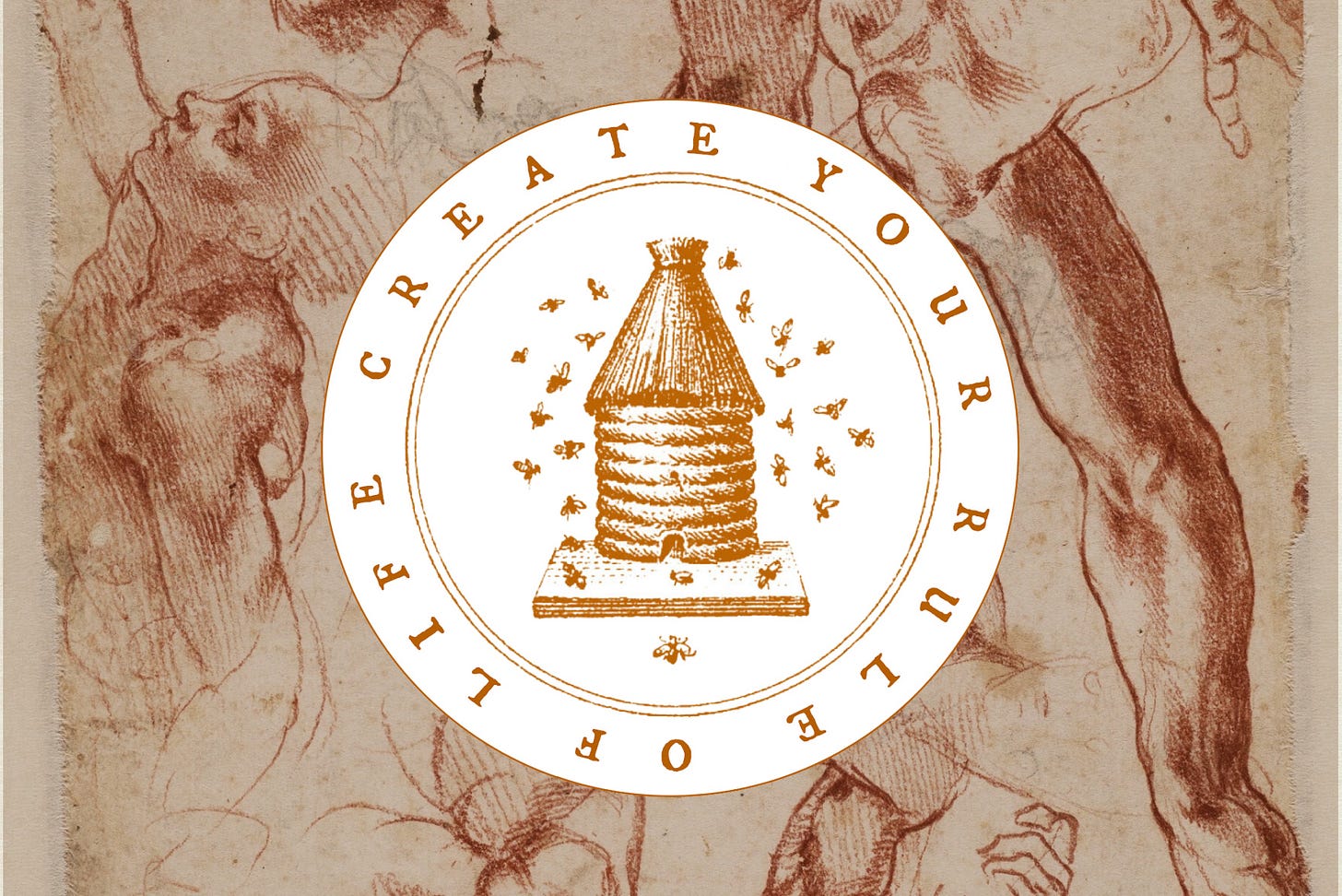Write Your Rule Before You Make Your Rules 📏
a timeless practice for your modern life
Happy New Year! I love this time of year because there’s almost always a ubiquitous, universally felt longing for renewal in the air. Even though it’s still Christmastide, something about the weeks after the serious feasting enjoyed on Christmas Day, followed by New Year’s Eve, leaves in so many of us a taste for a metaphorical juice cleanse for our souls.
Technically, there’s nothing special about the start of another calendar year. Time continues on as we move more deeply into winter, the flora and fauna oblivious to our tearing away of another calendar page, and we who have circled the sun a time of two know what's to come in these early months. We start gung-ho with all our lofty plans and goals, then we forget them come mid-February, kicking ourselves for our lack of discipline. And though we’re not surprised by this, we wish, deep-down, that this year would have been different. This was going to be the year when all our desires for change actually amounted to activity.
This was me for so many years. I’d nod along with all the cool kids who looked down on New Year’s resolutions, secretly making them anyway and blanketing my year with prayer that I could somehow, magically, follow through. I’d feel it in my bones the realization that goals and self-imposed rules were good for me, but I just couldn't figure out how to make them actually work. All the Thought Leaders™️ in the world could espouse their disciplined formulas and sell me their online courses with promises I’d see real change, but it ...just wouldn't work for me.
If you’ve read my words for any length of time, you know where this is going. The reason my goal-setting never worked was because I was setting goals I thought I was supposed to make, not goals that actually mattered to me. The tool that best helped me finally discover what truly mattered to me was writing my Rule of Life.
Once I wrote it, and continued to revisit it throughout the year, I was able to pursue habits that finally led to legit goal accomplishment—goals that both met me where I was in my real life and that pushed me toward a higher, deeper calling. I’m not perfect at it by any means, and this will indeed be a lifelong endeavor (ask me about any of my vices), but my trajectory is in the right direction, and I’ve consistently slept at night for several years now knowing I’ve faithfully dusted myself off and tried again, day after day, to pursue who I'm meant to be.
Yes, all this is to remind you that I’ve created a self-paced audio workshop called Create Your Rule of Life, based on my own experience crafted specifically to help ordinary folks like you and me write our tailor-made Rules that spur us on to goodness. But this is also me announcing that I’ve finally re-released it with a number of changes that I’ve wanted to make for a long while now.
To spare you a boring litany of details, here are some specifics, Q and A-style.
Q: What's a Rule of Life?
A: The simplest definition for a Rule of Life is that it's a “commitment to live your life in a particular way.” The concept has been around for almost 2,000 years, but we associate it most with St. Benedict, a 6th-century theologian credited as the Father of Western Monasticism. He wrote his community’s Rule for living in such a life-giving way, naming both the why and the what of their daily habit practices, that millions of others have since copied his format. To this day, all Benedictine communities live according to his 1,500-year-old Rule.
Q: What does a Rule of Life do?
A: It’s helpful to start with what a Rule isn’t. It isn't a to-do list, a set of goals, or a prescription for rigid living. A good Rule simply names unique habit practices that lead to living according to certain values. Once you unearth these values, you name particular ways of living that turn these values from well-intentioned ideas to actual realities. It's not a magic formula, but a good Rule, like a ruler, draws the straight line you want your life to live up to.
Q: Is a Rule of Life rigid?
A: Yes and no. A good Rule is idealistic and should name habit practices that call us to higher virtue—a lifelong pursuit for all of us—so in that regard, it’s rigid because it reveals where we still fall short of that straight line. But it’s also flexible because it’s not our master, it’s a tool; it serves us, not the other way around. As you learn more about who you are and how God made you, you tweak your Rule so that it better aligns with your life’s realities. I revisit my Rule twice a year: on my summertime birthday and at the start of a new calendar year. So, right now!
Q: What's new about this workshop?
A: It’s still self-paced, it’s still audio, and its end goal is still the same: to help you write your own Rule. But in the past few years, I’ve learned a lot about Benedictine tradition and the wisdom that it holds for all of us, and I re-structured the workshop so that it better aligns with Benedictine fundamentals. Those include:
• A focus on the universal life calling for all of us: the pursuit of virtue as a habit. Another way to say this is “sainthood” (or Christlikess), which simply means saying yes to God again and again, our entire lives. This is true for every one of us, even if we don’t recognize it as such. This is our telos. We are all called to a lifelong pursuit of virtue as a habit.
• A use of the Benedictine foundations of “ora et labora” (pray and work) as our daily calling, the vows of obedience, stability, and conversion (even for us non-monks), and the Four Cardinal Virtues as our highest goods, no matter who we are or what life we've been given. (This sounds lofty—and it is—but the workshop unpacks these things and makes them accessible.)
• A scaffolding that upholds the five Benedictine habit practices of prayer, work, study, hospitality, and renewal as the life domains for all of us. The workshop asks us to systematically name our life particulars within this framework, which then leads to writing Rules unique to our unique lives.
A focus on “memento mori”—a remembrance that we will indeed die, which reminds us of our lifelong, ultimate purpose. It’s easy to forget in the thick of things that our dishwashing, spreadsheet-making, errand-running, and parenting all have eternal consequences. But write your eulogy, and the hierarchy of goods fleshed out in your day-to-day choices snaps life into focus real quick.
• Still self-paced, the course is manageably broken down into seven sessions, providing the options to either deep-dive it all in one long day of contemplative focus, or to think through each piece a bit of time amid real-life nooks and crannies. Or somewhere in the middle. Whenever it works best for you.
• It still comes with audio files you can play again and again for as long as the course exists (it’s intentionally audio, not video, because I want to be out of the way as much as possible). It also includes a downloadable workbook to walk you through the whole process, as well as one master audio file of the entire workshop you can store on your own device and take with you. The technology is intentionally minimal so that you don’t have to depend on an internet connection.
• Access to my own personal, continually-tweaked Rule of Life—not as a prescription, but as a description for how yours might work (or not). Sometimes we want to see what someone else is doing, but with freedom to depart from the formula when it’s better for us.
I’ve decided to keep the workshop’s price the same for the first week of 2024, in case you’re on the fence—now’s a great time to enroll, even if you’re not sure you can write your Rule right now (remember, you get access for as long as it exists, and it’s self-paced, so you can do it on your timeline). I’m raising the price next week (we can thank inflation), but it’ll still be an accessible price because I'm such a big believer in everyone writing their Rule.
I’ll be talking about more about Rules of Life in the first podcast episode of the year, so be looking out for that in the coming weeks (subscribe if you haven’t, so it’ll show up in your feed!). In the meantime, however, I wanted you, a Commonplace subscriber, to know about these updates first.
(By the way: if you've already enrolled, check your email inbox with the subject line “Create Your Rule of Life is Updated!” because I've already shared with you some details, including access to the files for the workshop’s previous version, in case that's more your cuppa tea.)
Regardless of whether you enroll in this workshop or use some other method, I absolutely believe that you should write a Rule of Life before making anything resembling New Year's resolutions, goals, self-imposed rules, or whatever you want to call them. Give yourself the gift of setting realistic goals that matter to you instead of what someone else, well-intentioned as they may be, tells you what matters in your life.
You’re smart: you have the capacity to name your values. You just need to do it. Sometimes a guide is helpful.
I hope the rest of your Christmastide is both enjoyable and life-giving, and that you embrace the virtue of hope as you look toward 2024. I’m grateful you’re here, reading these words! I’ll be back here with more soon.
Ora et Labora,
Tsh





